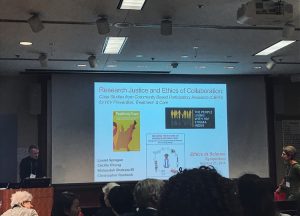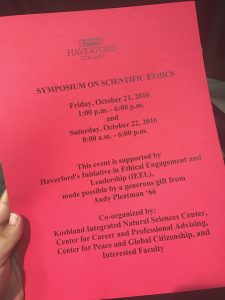This weekend Haverford College is hosting a symposium that discusses questions of ethics in science and research. Today I was able to attend a panel of three HIV activists as they discussed the ideas that are central to their work.
The main topic of discussion in this panel was community-based participatory research (CBPR) in relation to HIV and AIDS. This discussion was my first introduction to the idea of CBPR and opened my eyes to so much. CBPR aims to do research work with the very people they are trying to help, rather than on these people. It centralizes research justice in order to involve communities in the work that is being done.

Panel on HIV/AIDS research
The three panelists were all women who are living with HIV. The words they shared with us today moved me and challenged me to think critically about research and what constitutes research justice.
In order to not be carried away by my passion for these conversations, I’ll just quote one important thing from each panelist that I consider valuable.
Laurel Sprague (on why it’s important to have people living with HIV involved in the research being done): “If you are not inclusive, you are exclusive.”
Cecelia Chung (on what it felt like to be a trans woman of color living with HIV trying to do activism): “I felt like I was banging on the door of a very privileged system.”
Waheeda Shabazz (on why de-personalizing people is problematic): “It is important to be identified as a person not an HIV-infected person… I am a person thriving with HIV. I have done nothing since [my diagnosis] but thrive.”
This panel gave me a lot of insight on research and how to make research do the best work it could do. It reminded me just how important it is to give the people who have the most at stake a seat at the table.
I really enjoyed the panel and the student poster presentations today and I can’t wait to see what tomorrow’s sessions have to offer.

